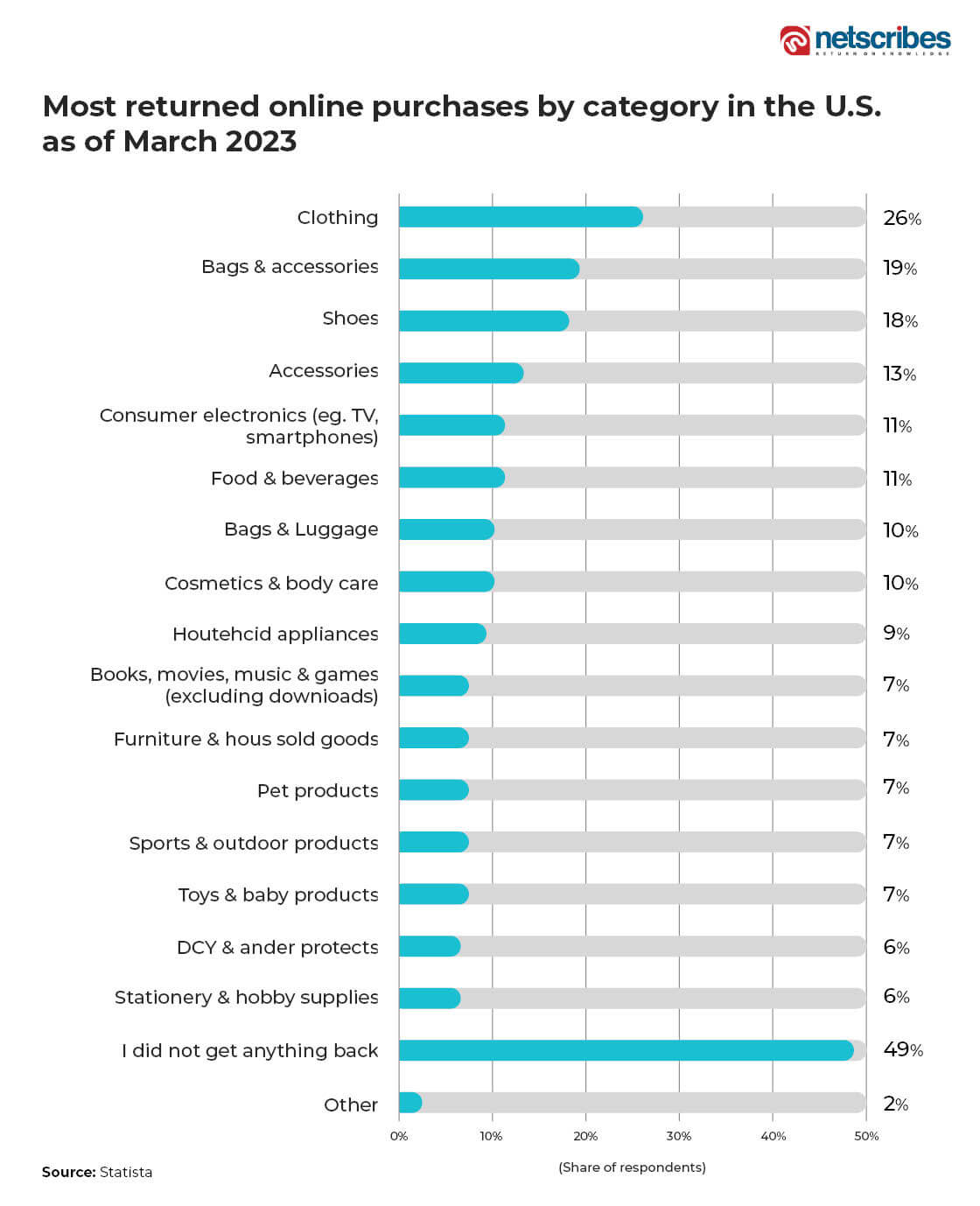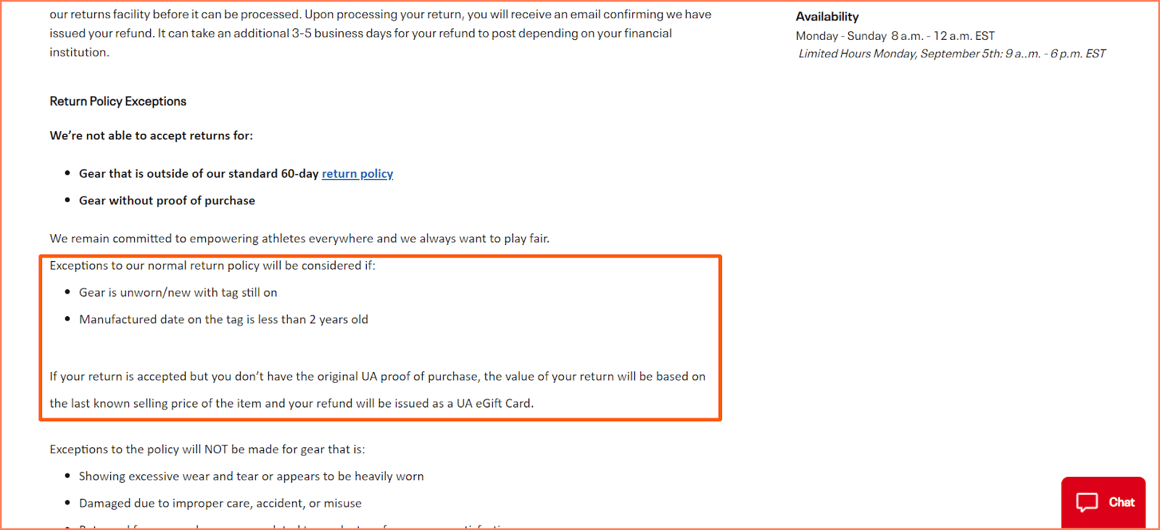Highlights
- Delving into the critical impact of efficient e-commerce returns management, get in on the key aspects like financial implications, customer satisfaction, and the role of technology.
- Unearth the intricate connection between returns management and customer loyalty, emphasizing the influence on brand reputation.
- Dive into the challenges in the returns landscape, and the ripple effect on brand perception and proposed sustainable practices for thriving in the evolving e-commerce domain.
- Gain insights into future trends, from AI-driven policies to virtual fitting rooms, offering businesses a strategic perspective to stay competitive.
Within the digital commerce world, one critical facet that often determines customer loyalty and brand reputation is ecommerce returns management. According to the National Retail Federation (NRF), retailers face a significant challenge with merchandise returns, incurring an average of USD 165 million in returns for every USD 1 billion in sales. Additionally, the impact of return fraud is noteworthy, with a loss of USD 10.40 for every USD 100 in returned merchandise accepted.
The NRF’s 2022 survey reveals a concerning trend in fraud expectations, showing a 43% year-over-year increase, rising from 9.8% to 14%, even when a receipt is present. When consumers were asked to identify the most returned purchases by category, clothing emerged as the top choice for 26% of respondents, followed by bags and accessories at 19%, and shoes at 18%. This sheds light on the specific product categories that pose the greatest challenges for retailers in managing returns.

Understanding ecommerce returns management
Returns management involves the efficient handling of product returns in the e-commerce supply chain. It encompasses various components, including reverse logistics, restocking, and disposal. Understanding the role of returns in e-commerce operations is pivotal, as it directly affects customer satisfaction, operational costs, and overall business success.
The link between returns management and customer loyalty
Transparent returns policies build trust. When customers know what to expect during the returns process, it fosters confidence in the brand. Clear communication on return windows, conditions, and refund processes establishes a foundation for a positive customer experience. Here’s an example from Under Amour of how it mentions exceptions and leaves no room for doubt.

A seamless returns experience is essential for customer satisfaction. Streamlining the returns process, from initiation to resolution, ensures that customers feel supported and valued. This, in turn, enhances their loyalty to the brand.
Positive returns experiences contribute significantly to customer loyalty. Especially during the holiday season, consumers are increasingly prioritizing hassle-free and tailored return experiences, with 76% emphasizing the significance of complimentary returns when making online purchases.
When customers find the returns process hassle-free and fair, they are more likely to make repeat purchases. An overwhelming 89% of individuals are inclined to engage in additional purchases following a positive customer service encounter, presenting a substantial opportunity for boosting both repeat sales and customer retention rates. E-commerce businesses can leverage returns as an opportunity to exceed customer expectations and build long-term relationships.
The ripple effect on brand reputation
- The power of positive customer reviews and testimonials
Satisfied customers become brand advocates. Positive reviews and testimonials resulting from a smooth returns process can significantly enhance a brand’s reputation. 92% of consumers read online reviews before making a purchase decision. Customers who have positive experiences are more likely to share their satisfaction, influencing potential buyers. - Mitigating negative feedback through effective returns management
On the flip side, mishandled returns can lead to negative feedback. Effective returns management mitigates this risk by addressing customer concerns promptly and professionally. Proactive resolution of return issues demonstrates a commitment to customer satisfaction. - How brand perception influences purchase decisions
Brand perception directly influences purchase decisions. Favorable brand perception within your target audience is the driving force for brands. Statistics reveal that 77% of consumers are inclined to recommend a brand to others when they have had a positive experience with it. Moreover, consumers are more likely to choose a brand with a positive reputation, especially in the context of returns. A strong returns management strategy contributes to a positive brand image, impacting consumer trust and choice.
The cost of poor returns management
- The financial impact of inefficient returns handling
Inefficient returns handling comes with a financial cost. Businesses incur additional expenses in processing returns, restocking inventory, and addressing customer dissatisfaction. An optimized returns process contributes to cost savings and improved profitability. - Customer dissatisfaction and its long-term consequences
Unsatisfied customers may not only refrain from future purchases but can actively discourage others. The long-term consequences of customer dissatisfaction extend beyond a single transaction, influencing the overall success of an e-commerce business. - Potential negative word-of-mouth and social media fallout
In the age of social media, negative experiences can quickly spread. A dissatisfied customer sharing their experience online can impact a brand’s reputation on a larger scale. Prioritizing returns management is crucial in avoiding negative word-of-mouth and maintaining a positive online presence.
Leveraging technology for returns efficiency
Returns automation systems streamline the returns process, reducing manual errors and accelerating resolution times. Integrating automation enhances efficiency and allows businesses to focus on providing a better customer experience.
Integration of returns management software with e-commerce platforms ensures real-time data synchronization. This integration facilitates accurate tracking of returns, enabling businesses to make informed decisions and improvements. Data analytics provides valuable insights into return patterns and customer behavior. By leveraging this data, businesses can optimize returns processes, identify trends, and implement changes that enhance overall efficiency.
Future trends in ecommerce returns management
From artificial intelligence to automation, emerging technologies offer innovative solutions to enhance efficiency and transparency in returns processing. Virtual fitting rooms empower consumers to make informed purchasing decisions, reducing the need for multiple size and color purchases that often result in returns. AI-driven return policies offer flexibility tailored to individual customer profiles, allowing high-value customers more return options or a more lenient returns policy.
To enhance sustainability in returns, AI evaluates the return’s condition considering factors like geography and seasonality. This analysis determines the optimal return routing, maximizing resale value and contributing to more sustainable business practices.
Technology-driven automation can handle repetitive tasks, such as generating return labels, initiating refunds, and updating inventory levels. This not only speeds up the return process but also reduces the likelihood of human errors. Proactive adaptation to industry changes and the integration of new technologies will be essential for staying ahead of the curve.
Related reading: The future of online returns fraud: Trends and predictions
As we conclude, the message is clear: prioritize returns management to thrive in the competitive e-commerce landscape. Investing in efficient returns processes is an investment in customer satisfaction, loyalty, and long-term brand success.
The impact of ecommerce returns management extends far beyond the logistical realm. It shapes customer perceptions, influences purchase decisions, and ultimately determines the success of an e-commerce business. By embracing best practices and staying ahead of industry trends, businesses can turn returns into a strategic advantage and solidify their position in the market.
To know how we can help you up your business game in driving an efficient ecommerce returns management process, contact us today.






